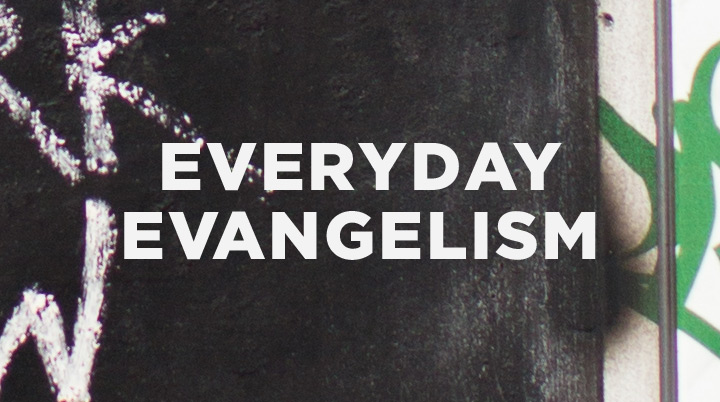Latest
-
Objections to the Christian Faith from the Unchurched and De-Churched
 Tue Dec 02, 2014
Tue Dec 02, 2014
by Resurgence -
Craig Groeschel: We Innovate for Jesus
 Tue Oct 14, 2014
Tue Oct 14, 2014
by Resurgence -
Mark Driscoll: Revelation
 Tue Oct 07, 2014
Tue Oct 07, 2014
by Resurgence -
RESURGENCE LEADERSHIP #034: JOHN PIPER, WHY I TRUST THE SCRIPTURES, PART 2
 Tue Sep 30, 2014
Tue Sep 30, 2014
by Resurgence -
Resurgence Leadership #033: John Piper, Why I Trust the Scriptures, Part 1
 Tue Sep 23, 2014
Tue Sep 23, 2014
by Resurgence

Archives
Everyday evangelism

“But in your hearts set apart Christ as Lord. Always be prepared to give an answer to everyone who asks you to give the reason for the hope that you have. But do this with gentleness and respect, keeping a clear conscience, so that those who speak maliciously against your good behavior in Christ may be ashamed of their slander.” 1 Pet. 3:15–16 NIV
Some people are natural evangelists. They somehow always seem to get into gospel conversations. They go into a shop, sit on the bus, or stand in a line, and they end up talking about Jesus. We do not know how they do it. Indeed most of the time they do not really know how they do it. It just seems to happen.
Neither of us is like that. We wish we were, but we are not natural evangelists. We have to work out how to do it. So our best course is to make merit of our deficiency and work out some ideas for sharing the gospel that other people who are not natural evangelists can use.
Everyday evangelism?
How can we talk about Jesus in the context of everyday life? If church and mission are more than an event to which we invite people, if they are about ordinary life with gospel intentionality, how do we do everyday evangelism?
The content is the gospel and the context is everyday life.
The first answer is to do everyday pastoral care. Think of your Christian friends as an opportunity to practice! If you find it hard to talk about Jesus with Christians, then how do you expect to talk about him with unbelievers? As you get more in the habit of talking about Jesus in the everyday with Christians, you may find it easier to talk about him with unbelievers. The links between everyday life and Jesus will become easier to spot. Let your unbelieving friends overhear you talking about the gospel with one another. We do not mean stage-managed conversations—people will see through that straight away. We mean exposing them to a community genuinely centered on Jesus. As people come into this community, they will hear the gospel being spoken around them.
We want to suggest some tools for talking about the gospel with your unbelieving friends. In pastoral care and evangelism, the content is the gospel and the context is everyday life.
Evangelism in a post-Christian culture
Many current evangelistic approaches assume a Christian culture, but, as we have seen, we live in an increasingly post-Christian culture. People are biblically illiterate. They do not start with the basics of a Christian worldview. Guilt, faith, sin, and God are all empty or confused concepts for them. They probably will not be converted through a ten-minute gospel presentation on the back of a napkin. They need a lot of nudging. They need a lot of gaps filled in, or else they will start with a deep-seated antipathy toward Christianity. They are most likely not going to welcome a four-point gospel presentation, however well practiced.
If we could place people on a range of one to ten depending on their interest in the gospel, where one is no interest and ten is a decision to follow Christ, lots of evangelism assumes people are at around eight. We teach our gospel outlines. We teach answers to apologetic questions. We hold guest services. We put on evangelistic courses. We preach in the open air or knock on doors. All these are great things to do, but about 70 percent of the population is at one or two.
Many of us know how to answer the question, “What must I do to be saved?” But we do not know how to begin a conversation about Jesus.
Many of us know how to answer the question, “What must I do to be saved?” But we do not know how to begin a conversation about Jesus. Our only hope is a crass, awkward change of direction, like crunching the gears in your car. So you are watching football and you resort to saying things like, “At last a substitution. Did you know that Jesus could be your substitute?” “Great goal. What about you? What’s the goal of your life?” “Come on referee! That was never a penalty! Did you know Jesus paid the penalty for our sin?”
We need to be patient and trust God’s sovereignty while also finding ways to presenting the gospel at points one and two on our scale of interest in Christ and not just at points eight and nine.
This post is adapted from Everyday Church: Gospel Communities on Mission by Tim Chester and Steve Timmis copyright © 2012. Used by permission of Crossway Books, a publishing ministry of Good News Publishers, Wheaton, IL 60187.
